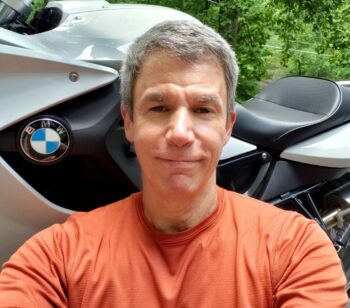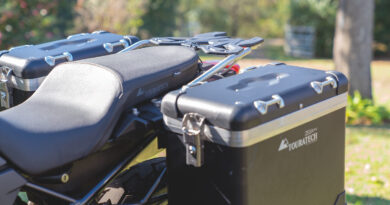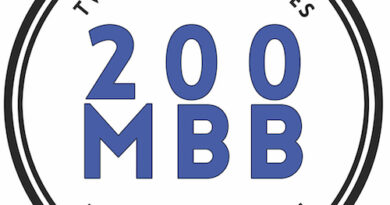Cycles
It’s been over a week since I returned home from the 2022 Rally, and I’ve plowed through the most urgently overdue work and domestic responsibilities that accumulated during my absence. Time to finally wash the bike! I’ve been looking forward to this chore since before my trip. Odd? Perhaps, but here’s why.
 For me, motorcycling has always involved a swinging pendulum. At one end of the arc is my house, with its driveway, garden hose and garage workshop. At the other end is the world at large, full of discovery, challenge and adventure. Preparations, repairs, modifications and cleaning happen at home; these are necessitated by what goes on elsewhere, both beforehand and afterward. Like the chicken-and-egg conundrum, each pendulum swing leads to the next and it’s impossible to say when the process actually began—nor does that matter. These cycles have been underway since my pre-teen years and they’ll doubtless continue until I’m no longer able to sustain them. No need to analyze which is the ultimate cause or effect.
For me, motorcycling has always involved a swinging pendulum. At one end of the arc is my house, with its driveway, garden hose and garage workshop. At the other end is the world at large, full of discovery, challenge and adventure. Preparations, repairs, modifications and cleaning happen at home; these are necessitated by what goes on elsewhere, both beforehand and afterward. Like the chicken-and-egg conundrum, each pendulum swing leads to the next and it’s impossible to say when the process actually began—nor does that matter. These cycles have been underway since my pre-teen years and they’ll doubtless continue until I’m no longer able to sustain them. No need to analyze which is the ultimate cause or effect.
Listen to this column as Episode 24 of The Ride Inside with Mark Barnes. Submit your questions to Mark for the podcast by emailing [email protected].
While I was certainly excited about numerous aspects of my rally trip, I would play the tape of my expectations all the way to the end, including the epilogue of washing a week’s worth of bugs and road grime off my bike at the journey’s conclusion, when all the intervening events would be over. I imagined many would have been glorious and I’d be sad they’d passed. There might also have been scary, annoying, or tedious parts—always possible when traveling—and I’d be relieved to have those behind me; maybe they’d make good stories and teach me useful lessons for the future, but the tough parts would be done. The afternoon spent cleaning and maintaining my motorcycle, restoring its setup to “regular” mode from its touring configuration, would be a chance to reflect upon all that had occurred on my voyage, organizing, savoring, and perhaps shuddering as I reviewed memory after memory. The hyper-familiar, repetitive, relatively mindless tasks of washing each area of my bike and swapping out a few peripheral parts would create the perfect context for such meditations.
This is really just a larger scale version of what happens for everyone on a daily basis. During our waking lives, we experience joys, endure tragedies, take up difficult challenges, and execute countless routines, amassing a multitude of memories in the process. Some of these are more—er –memorable than others, with many being so forgettable we do exactly that. The more salient recollections are usually those with an emotional charge, good or bad, and the intensity of that charge typically determines how easily we’re able to access them later. However, said charge can also yield distortions that reduce the accuracy of those images most forcefully burned into our memories—a paradox, for sure.

There’s also an imbalance between the priority given to good versus bad memories, with the latter getting preferential treatment. Perhaps historically our survival has been better served by remembering where we encountered the bear, as opposed to where we found the honey. We may be hungry longer while hunting forgotten food supplies, but our ability to perpetuate the species could end immediately upon another surprise encounter with the bear. Therefore, it makes some sense we may recall awful events more readily than sweet ones. This is even facilitated by the architecture of our brains, with bilateral structures called the amygdalae and hippocampi adjacent to one another and intimately connected.
Each hippocampus/amygdala combo resides inboard of the left and right temporal lobes, which in turn sit just above each ear canal. The right amygdala is especially associated with alarm responses, and its activation seems to have a powerful impact on the neighboring hippocampus, the latter playing a central role in logging and retrieving memories. Hence, our recollection of traumatic events may be eternally vivid (extreme examples include the flashbacks of PTSD), although they can also be fragmented and scrambled, with certain details all too accessible and others completely lost. This does not mean such memories are dismissible as inherently inaccurate, but rather an understanding of this phenomenon must be employed in making sense of what can sometimes seem like an incoherent recording. Even in everyday situations, observers of the exact same incident will recall it differently, not only because they may have had physically disparate vantage points, but also because they will have automatically filtered and accentuated different elements based on the respective emotional valences those elements had for each witness. To complicate matters further, an individual’s memory of the same event will change over time, not simply because portions fade with age, but because each reconstruction takes place in the context of subsequent maturation and the immediate mix of emotional vectors and conceptual perspectives.

Back to those daily cycles. After a day of widely varying experiences, we may or may not want/need to remember, sleep is a vital part of sorting and consolidating the related memories. While the precise mechanisms remain largely mysterious, it’s clear that a lack of quality sleep interferes with learning, and not just because we’re tired while trying to attend to something the following day. What we learned the prior day isn’t encoded (memorized) well without good sleep. You may have experienced the positive side of this during a two-day rider training event. Something that gave you fits on the first day can seem to have miraculously fallen into place at the start of the second. Sleep allowed for an internal reorganization, integrating the new information and instructions, and presumably not only from teacher to student, but also from brain to muscles during the associated practice. The notion we should “sleep on it” after being presented with a big choice is probably a result of people noticing how things often appear clearer and better organized the next morning. This isn’t just a result of rest, although it’s hard to overstate the benefits of relaxation and recuperation when contending with daunting challenges. It’s also a result of (good) sleep’s nightly psychological housekeeping, filing important memories in the proper folders and sending irrelevant stuff to the trash. Dreaming almost certainly plays a role in this process, although there are many conflicting ideas about its involvement.
Of course, the oscillation between making memories and storing them—pardon the oversimplified dichotomy—isn’t the only cycling we do on a regular basis. Something similar happens in the swinging back and forth between work and play, and I don’t just mean the work we do for pay. When we’re focused on problem-solving or accomplishing a task, our attention usually funnels down to a point, with other matters receding into the shadows so we can concentrate. This is obviously a helpful thing in many cases, or we wouldn’t be able to deliberately utilize our strengths to get things done. On the other hand, when we’re not working on anything in particular and our minds can roam freely—this is what I’m calling “play”—we may come up with novel, creative ideas that would never occur to us in a more structured mental state. How many times has something quite clever “come out of nowhere” while you were taking a shower? Have you ever stared idly at a random assortment of items on your workbench and suddenly realized you could assemble several of them into a useful gadget? Maybe that specific example doesn’t apply to you, but I’d be shocked if you haven’t experienced something similar. What about looking up from the middle of your sandwich with a piercing insight into some matter you struggled to understand several hours ago, but which you weren’t consciously thinking about at all prior to your lunch break epiphany?

It would be great if we could willfully employ both focused concentration and open-ended creativity when approaching problems, since both have advantages, but these two states can be mutually exclusive. “Work” is often done under some type of pressure to perform, and while a person may devise creative solutions on purpose, it’s frequently an effortful, inefficient process compared to the spontaneous eruption of possibilities generated by a relaxed, playful mind. Stress can preclude the very inventiveness it’s intended to produce, like your boss saying, “The beatings will continue until morale improves!” The best we can do is ensure we have regular downtime wherein our minds are free to aimlessly explore, fool around, and enjoy a visit from our muse. We can’t force such visits to occur, but we can set up the conditions to increase their likelihood. We definitely guarantee such visits won’t happen by maintaining a perpetually pressured, sharply pointed focus. This is why it’s wise to walk away from a frustrating project and do something else for a while. Not only do we thereby avoid escalating anger and despair, but we invite a less deliberate type of problem-solving to take place in the background. We may find something baffling suddenly makes sense when we return, just as that awkward exercise in the rider training program felt much more natural after a good night’s sleep.
Whether in the form of caring for our bikes between outings, getting quality shuteye, or dawdling “unproductively,” even when—or especially when—we have much to get done, we all need periods of relative passivity in order to fully process what we do actively. Happy cycling!
Mark Barnes is a clinical psychologist and motojournalist. To read more of his writings, check out his book Why We Ride: A Psychologist Explains the Motorcyclist’s Mind and the Love Affair Between Rider, Bike and Road, currently available in paperback through Amazon and other retailers.




